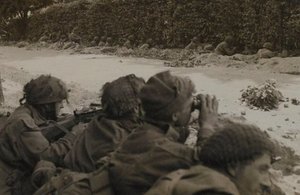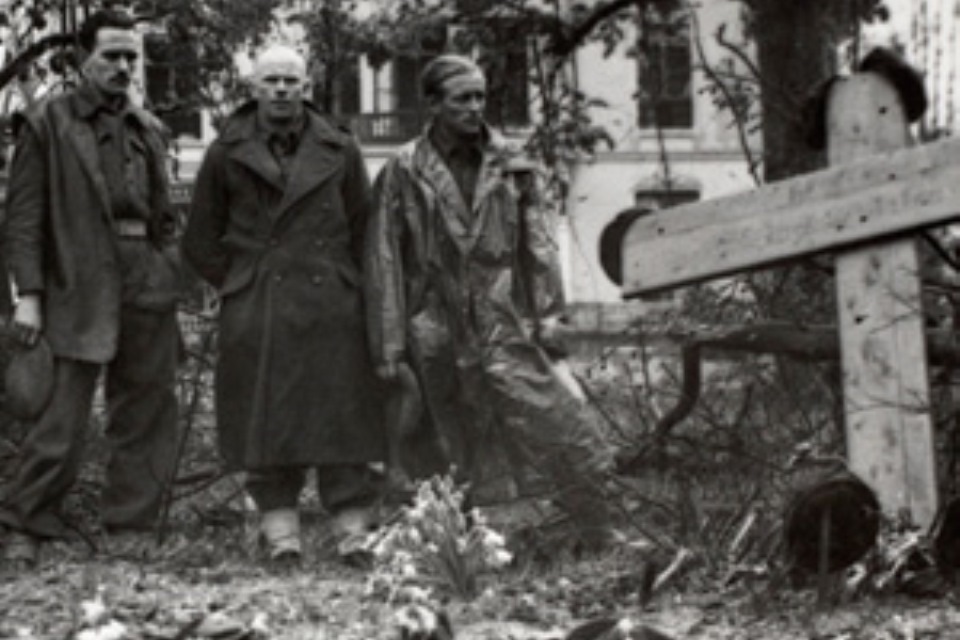Urgent appeal for family of Durham Lance Corporal Raymond Halliday
MOD’s Joint Casualty and Compassionate Centre is appealing for Raymond’s family to get in touch after his grave site has been identified.

Soldiers of the 1st Battalion, Border Regiment, Oosterbeek 20 September 1944, Crown Copyright
Lance Corporal Raymond Halliday enlisted in the Border Regiment in April 1940 but was tragically killed in 1944 during the last few days of Operation Market Garden in Oosterbeek, the Netherlands. Today, the MOD’s Joint Casualty and Compassionate Centre (JCCC) is appealing for Raymond’s family to get in touch after his grave site was finally identified over 70 years after he was killed in action.
Raymond was born in Durham in January 1918 to Henry and Nancy Halliday. He married Lily Hunter in 1934 and it is believed that they had a son together, also called Raymond.
He was part of 1st (Airborne) Battalion, The Border Regiment and fought in Oosterbeek during Operation Market Garden, one of the most controversial Allied operations of the second World War. The operation was conceived by Field Marshal Bernard Montgomery as an attempt to end the war early. The operation began on 17 September 1944, lasted for 7 days and involved over 30,000 men. The aim was to take the 8 key bridges that span the network of canals and rivers on the Dutch/German border.
Once the Airborne troops had landed, they began to advance towards Arnhem. They quickly found their radios were not working, communication with other Brigades became nearly impossible resulting in only 1 British Battalion managing to find its way through the German perimeter. XXX Corps, who were meant to be supporting the Paratroopers, was delayed on their journey and were facing fierce resistant from the German Panzers. On the third day they reached the Nijmegen Bridge, but crossing it was extremely costly to the allies. By this point the paratroopers had barely any supplies left and had lost huge amounts of men. The allies were forced to abandon their positions and try to fight their way out. Three miles from Arnhem, British paratroopers were holding a pocket of land at Oosterbeek. It was decided to evacuate the Allied troops and Operation Market Garden failed.
Since the second World War, the Recovery and Identification Service of the Royal Netherlands Army has been working to identify the graves of unknown soldiers killed in the battle at Arnhem. The exhumation reports from 1946 were scrutinised for clues to the identities of these unknown soldiers and the research was presented to the MOD. After performing an in depth examination, 6 Border Regiment soldiers have now been identified.

British Soldiers standing respectfully at a grave in Arnhem, 1944, Crown Copyright
One of these soldiers is Lance Corporal Raymond Halliday and we are now planning to change the headstone and perform a rededication service to honour their sacrifice and bravery.
The MOD is now launching an appeal to track down any of Raymond’s surviving relatives so that they can be invited to attend the service which will take place at Oosterbeek Cemetery on 14 September.
Nicola Nash, from the JCCC said:
We do not know a great deal about Raymond, but what we do know is that he was living in Stockton-on-Tees with his wife Lily when he enlisted. We believe they may have had a son together, also called Raymond, who was born in 1942 and still lives in the area.
She added:
Unfortunately that is about all we know about him and his family and that’s where the trail goes cold.
If you can help with tracing Raymond’s family, please call Nicola on 01452 712612 extension 6063 or email her on: dbs-jccccommem3so3@mod.uk